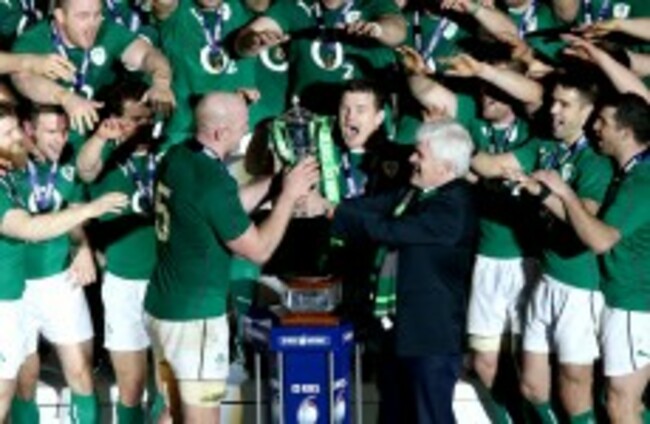THE SIX NATIONS board has suggested that it could consider offers from pay-television operators for its next TV rights deal in Ireland and the UK, which is set to begin in 2018.
RTÉ and the BBC’s current rights deals conclude after the 2017 tournament, but thereafter Six Nations organisers may look to the increasing wealth of subscription channels such as Sky Sports and BT Sport as a means to increasing revenue.
An ending of the long-standing tradition of live Six Nations games being broadcast on free-to-air television would be greeted with dismay by rugby supporters.
The fears stem from a report in this morning’s Telegraph, in which Six Nations chief executive John Feehan admits the competition board must look at all their options in relation to the next TV rights deal.
“We have developed the greatest championship in world rugby and the reality is we need to ensure that we continue to generate revenues that can fund and develop the game within the northern hemisphere,” Feehan told the Telegraph.
The Six Nations is fundamental to that. Without the revenues that the Six Nations brings in, most of the home unions probably couldn’t survive.
“So the reality is that this is an extremely important revenue stream and broadcasting is an extremely important element of that revenue. So I don’t think it is good enough just to say we wouldn’t consider every option.
“Clearly it has worked extremely well on free-to-air terrestrial and clearly they continue to be interested in going forward and we will engage very strongly with them.
“But it is an open market place and we need to keep that in mind.”
Feehan did indicate that were the Six Nations to be shown live only on a pay operator, delayed coverage and highlights of each fixture would still be available on terrestrial, free-to-air broadcasters.
BT and Sky would be the strongest contenders should the Six Nations turn to pay-television operators, with the former having surged strongly onto the market in recent years to rock Sky’s previously dominant position.
It remains to be seen whether this is simply a negotiation tactic to ensure RTÉ and the BBC continue to sink money into their rights to the Six Nations, but the idea alone will be unwelcome in may quarters.
“It is an ongoing negotiation and discussion and sometimes that is brought to a head and sometimes it is not,” said Feehan. “We will pick the right time when we believe it is the best time to go to market.”












mighty stuff!!
Well done Orla
Well done
Doing a great job out in Rio our Paralympions…. .
Well done Orla..XLNT
Brilliant, congrats Orla!
Well done each an every one of you. Just wondering is there any problem with families an friends getting tickets.??